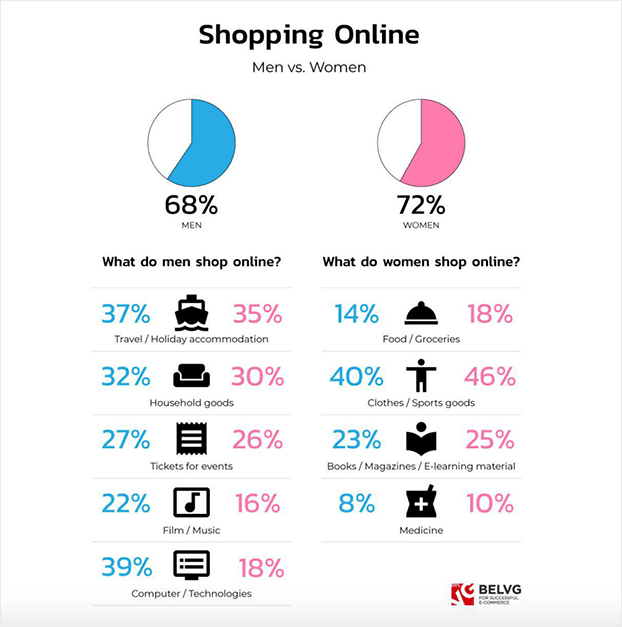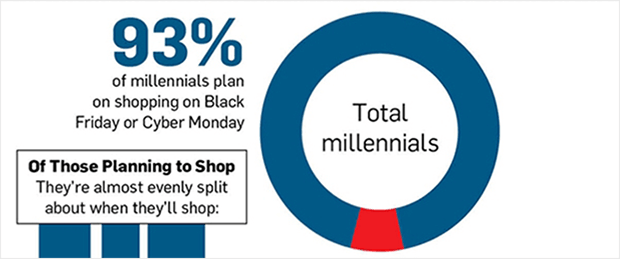Are you interested in knowing the latest online shopping statistics and trends?
Online shopping has seen significant growth in recent years. It is expected to continue to grow, given how digitalization and the internet allow companies to sell without a physical presence.
Among consumers, factors such as convenience, a wider selection of goods, and competitive prices have contributed to the increase in online shopping.
If you want to start an online business or already have one, the following online shopping trends statistics will help you better understand the trends and changes in this rapidly growing ecommerce industry.
Let’s dive into the online shopping statistics that you need to know:
If you’re looking for specific online shopping trends, here’s a menu to jump straight to them!
- Online Shopping Statistics: General
- Online Shopping Statistics: eCommerce Stores
- Online Shopping Statistics: Mobile
- Online Shopping Statistics: Abandoned Cart
- Online Shopping Statistics: Technology
- Online Shopping Statistics: Black Friday and Cyber Monday
- Online Shopping Statistics: Gen Z
- Online Shopping Statistics: Payment Method
1. Online Shopping Statistics: General
Let’s begin with general online shopping statistics to give you an idea of the industry’s size.
In 2022, there were 268 million online shoppers in the United States. This number is projected to increase to almost 285 million online shoppers in 2025.
But Americans aren’t the only ones who shop online. People all over the world understand the benefits. Almost 50% of social commerce consumers in China have made purchases through social networks, giving it the highest rate globally.
According to recent estimates, global e-commerce sales will reach $58.74 Trillion by 2028. This represents a significant increase from previous years and indicates the growing popularity of online shopping.
Additionally, online retail sales are projected to grow at a compound annual growth rate (CAGR) of 14.6% from 2021 to 2028. This means that the online shopping industry is expected to continue growing at a rapid pace for the foreseeable future.
If we’re looking at statistics by gender, the difference between the percentage of male and female shoppers isn’t a breath stopper. 72% are women, while 68% are men.
The main difference between men and women is what they shop for. Men usually go for heavy-duty items like furniture and computers, while women typically shop for things like groceries and clothing.
Moreover, the most popular product categories purchased online include clothing and footwear, books, and electronics. This is not surprising given the convenience of shopping for these items from the comfort of your own home.
2. Online Shopping Statistics: eCommerce Stores
Amazon, Walmart, eBay, and AliExpress rank as the top e-commerce sites in terms of visitor traffic.
These four companies have become household names and dominate the online marketplace. They offer a wide variety of products at competitive prices, making them the go-to destination for many online shoppers.
If you think you have no chance against the big hitters, think again. And, if you still need to get into eCommerce market, it’s a great time to start because, in 2024, it is estimated that there will be 12 million – 24 million eCommerce stores globally.
It’s about time you start optimizing your eCommerce store or launch a successful eCommerce site.
Since online shopping, in general, is growing so fast, the next statistic shouldn’t come as a surprise to you. In 2023, eCommerce retail purchases are expected to rise from 14.1% to 22%.
But it’s important to make sure that your eCommerce site is optimized for user experience.
Something as easy to fix as an inconvenient return policy deters 80% of people.
Including thorough details on your product pages is so important. 88% of customers think detailed product pages are crucial for purchasing.
Website design is also everything. Have you ever visited an ugly website? One that looks like this?
You probably have at some point. And if you haven’t yet, we hope you never do. And we hope your customers don’t either. 38% of shoppers will leave a website if it looks unattractive.
3. Online Shopping Statistics: Mobile
Mobile devices, Apple or Android, smartphones and tablets, are increasingly used for online shopping, with mobile e-commerce revenue projected to reach $728.28 billion in 2025. This is not surprising given the increasing popularity of mobile devices and the convenience they offer for online shopping.
The average conversion rate for mobile e-commerce is around 0.55%. The average cart abandonment rate for mobile e-commerce is around 85.65%.
That’s why improving your SEO can help you catch those spontaneous shoppers.
SEO Guide SEO Made Easy—Ultimate Guide to Explode Your Traffic
Mobile shopping is quickly catching up to desktop shopping. It’s easier to do as people are often on the go. Mobile shopping allows for shopping from anywhere as long as there’s service.
The number of mobile shoppers in the US is expected to reach 187 million by 2024. That means the majority of your traffic will also come from mobile users. Because of this, optimizing your site for mobile is crucial.
People don’t only use their mobile phones to shop online, but 65% check for price comparisons while they’re physically shopping in-store. Checking things like price comparisons has influenced 51% of shoppers to purchase from a company other than the one they originally intended to.
Your store could be the alternative shoppers turn to, so make sure your mobile website is up to date on prices and information and is easy to find.
4. Online Shopping Statistics: Abandoned Cart
The number one reason for shopping cart abandonment is unexpected extra costs. Extra costs are responsible for 48% of all cart abandonment. And for a good reason too.
Nobody likes being hit with unpleasant surprises just as they’re about to make an exciting purchase.
With this information in mind, be honest and upfront with all the costs. If honesty isn’t your thing, you could lose out big time. With an average abandonment rate of 69.99%, eCommerce businesses could lose 3 billion per year or more.
Other factors contributing to cart abandonment are slow delivery (22%) and when internet users need to create an account before checkout process (24%).
But there are always ways to reduce shopping cart abandonment for your company. First, sending cart abandonment follow-up emails have an average of 45% open rate. And out of that 45%, 21% received click-throughs. That’s almost half!
Secondly, to reduce cart abandonment, you can offer a discount on the items left in the cart.
54% of shoppers will purchase the items in their abandoned shopping cart after seeing a discount on those prices.
5. Online Shopping Statistics: Technology
47% of consumers are open to using a chatbot to make an online purchase, and a study by Juniper estimates that chatbots will account for $112 billion in retail ecommerce sales by 2023.
For Millennials and Gen-Z consumers, a chatbox is the preferred support channel.
The main reason chatbots are so popular is that speed is always part of the equation when people want an answer. When people wait to speak with a service agent on the phone, it only takes 11 minutes before they get frustrated and hang up.
On the other hand, a chatbot will respond within a few seconds.
Another popular trend is voice assistants. If you have an iOS device, you’ve undoubtedly used Siri before. You might be surprised to know that voice assistant make up 20% of searches on Google. And 27% of the global population uses voice chat.
6. Online Shopping Statistics: Black Friday and Cyber Monday
As shoppers prepare to make online purchases, you should prepare to make crazy online sales.
Black Friday and Cyber Monday are still the busiest time of the year in terms of spending money. Did you know that in 2021, 155 million Americans shopped on this holiday? Each of these people spent an average of $430 per person.
But 93% of the biggest spenders, millennials aged 24-35, plan to shop during this weekend. And they spend an average of $419.52 per person.
The majority of shopping happens online, $8.9 billion. As you can imagine, shopping in a physical store on Black Friday could be a recipe for disaster. That’s why 50% of people stay at home and browse on their devices. On Cyber Monday, 53% of online purchases came from a mobile device.
Related ContentUltimate Guide to Black Friday & Cyber Monday Marketing [+ Calendar!]
7. Online Shopping Statistics: Gen Z
Although the oldest members of Generation Z are just now coming of age, their spending power is nothing to scoff at. Marketers must understand this generation’s unique needs and spending habits to stay relevant.
It’s predicted that Gen Z, born after 1998, will have $44 billion in buying power. As of now, 93% of parents say their Gen Z child influences household spending. And in just a couple of years, this generation will dominate 40% of all consumer shopping.
95% of this generation have a smartphone, which they spend nearly 10 hours or more per day on. Because of this, they are 2X more likely to shop on mobile devices than millennials.
54% of Gen Zers spend at least four hours daily on social media apps, and almost 38% spend even more time than that. 88% use YouTube, making it the generation’s most-used social platform. Instagram sits firmly in second, while TikTok and Snapchat tie for third.
85% of Gen Z use social media platforms to learn about new products.
8. Online Shopping Statistics: Payment Method
Debit and credit cards remain the most favored payment methods for online transactions. A staggering 70% of online shoppers prefer using their cards due to the convenience, security features, and widespread acceptance they offer.
With the introduction of EMV chips and secure online verification methods, card transactions have seen a decline in fraud rates by 15% in the past three years.
Digital wallets, such as PayPal, Apple Pay, and Google Wallet, have seen a 40% increase in usage over the past two years. 60% of millennials and Gen Z shoppers prefer digital wallets for their online purchases due to their speed and convenience.
In regions like Europe and parts of Asia, 25% of online shoppers prefer direct bank transfers, especially for high-ticket items. Direct bank transfers are viewed as more secure, with a 10% higher trust rating compared to other payment methods.
In countries where online payment trust is still burgeoning, COD accounts for 35% of online transactions. Interestingly, COD orders have a 20% higher return rate compared to prepaid orders.
Services like Afterpay and Klarna have seen a 50% increase in adoption over the past year. 45% of users of these services are millennials who appreciate the flexibility in payment.
While still a niche, 5% of online retailers now accept cryptocurrencies like Bitcoin and Ethereum as valid payment methods. The volume of cryptocurrency transactions for online shopping has grown by 30% in the past two years.
QR code payments are dominant in countries like China and India, with 55% of online transactions in these regions using this method. Popular apps like WeChat and Paytm have integrated QR code payments, making it easier for consumers to adopt this method.
In conclusion, online shopping is a rapidly growing industry that offers convenience, variety, and ease of shopping.
The online shopping statistics outlined in this blog demonstrate the growing popularity of online shopping, trends, and changes that are taking place in the industry.
With the continued eCommerce growth trends, online shopping will likely continue to be a major player in the retail industry for years to come.
Now that we have finished talking about statistics of online shopping and discussed the industry’s potential, you must be wondering how to boost your online store’s conversions.
All online stores rely heavily on generating leads via popups. OptinMonster is the most powerful conversion optimization tool and email popups creator in the world because:
- OptinMonster’s powerful drag-and-drop builder allows you to create visually stunning optin forms optimized for the highest conversion rates.
- You can choose from the perfect campaign type to display the most attention-grabbing offers to your visitors for maximum engagement.
- You can detect your visitors’ shopping behavior and use smart triggers to display the right campaign to the right person at the right time.
- It allows you to use precision targeting to create campaigns that generate more leads, attract more subscribers, and increase total retail sales.
- You can create campaigns that react and adapt in real-time so you can easily personalize, segment, and target for incredible conversions.
- You can get the stats that matter and the tools you need to take action and improve your lead-generation strategy.
Also checkout:
- Ecommerce Growth Statistics: Key Insights Every Business Should Know
- Shopify CRO: How To Make More Sales From Your Current Traffic
- Content Marketing Statistics: Everything You Need To Know
- 40+ Email Marketing Statistics You Need to Know
- 95+ Mind-Blowing Digital Marketing Statistics to Learn From
- Ultimate List of Blogging Statistics and Facts













Add a Comment